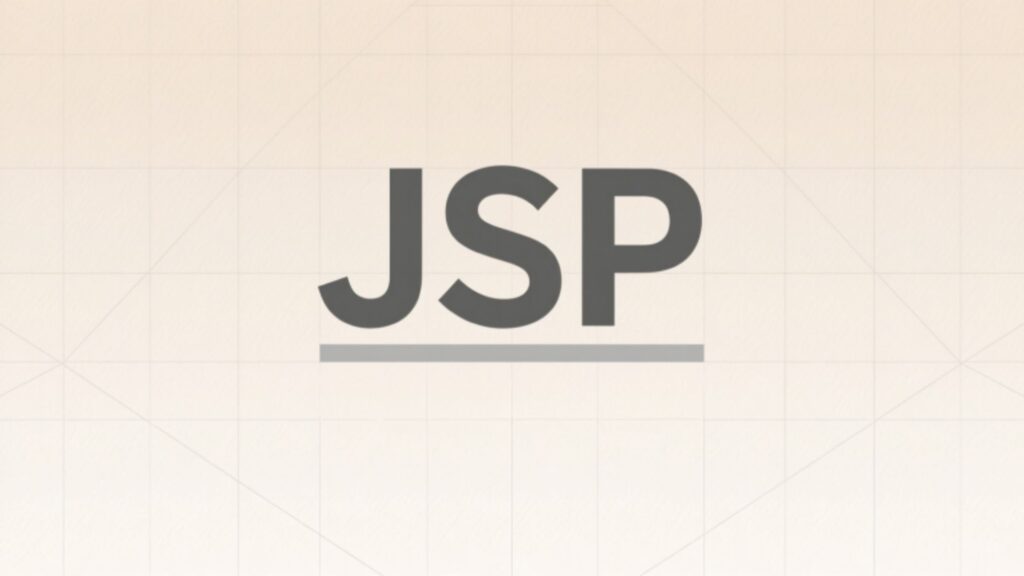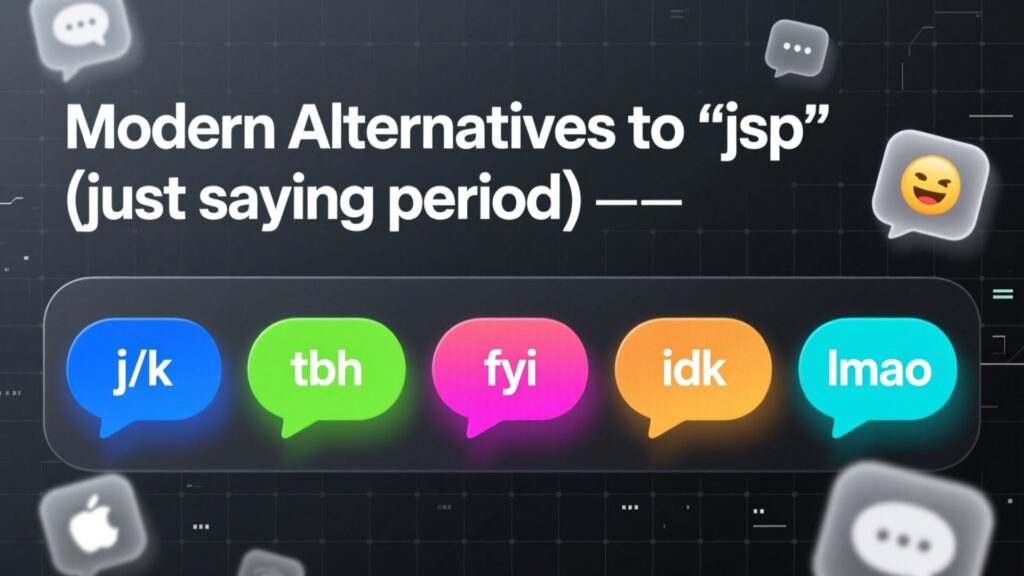Communication in 2025 moves at lightning speed. A few letters can carry a full tone, an opinion, or a micro-emotion. If you’ve ever seen jsp pop up in texting or social media and thought, “What on earth does that mean?” you’re in the right place. This article dives into what does jsp mean in texting, jsp meaning in text, jsp meaning text, what does jsp mean, and what does jsp mean in text. Let’s decode.
Introduction: Why “jsp” keeps showing up

You’re scrolling through a chat and see:
“That movie was great… jsp.”
What? Is it a mistyped word? A typo?
Turns out “jsp” might mean what you think it might mean something totally different depending on context.
In this post we’ll:
- Explore what does jsp mean in texting
- Pinpoint jsp meaning in text across platforms and generations
- Explain when to use i and when to avoid it
- Compare it with polite, professional alternatives
- Look at modern usage trends in 2025
If you’ve ever wondered about two (or three) letters that feel ambiguous, prepare for clarity.
What Does “jsp” Mean in Text?
When someone writes jsp in a casual message, it usually stands for “Just Saying, Period.” (textscode.com)
Band this is key it can also mean other things depending on culture or language. Let’s break it down.
Primary slang meaning
- J = Just
- S = Saying
- P = Period
So “jsp” = “Just saying, period.” In plain English: “I’m throwing this out there and I’m done.” It signals finality. (textscode.com)
Example:
“You should try it before judging… jsp.”
Here the writer means: “That’s all, I’ve spoken.”
Alternative/slang uses
In different settings you may find:
- “Just Saying, Please” (friendly suggestion) (bibleversaz.com)
- “Just Some People” (generalization) (bibleversaz.com)
- “Je sais pas” (French: “I don’t know”) used by French-speaking texters. (My Blog)
When the same letters mean something totally else
In technical or formal contexts, JSP often stands for Jakarta Server Pages (formerly JavaServer Pages). (Wikipedia)
So always check context. The meaning shifts based on where you’re reading it.
Quick summary table
| Context | What “jsp” means | Example | Tone |
|---|---|---|---|
| Casual chat | “Just saying, period” | “You might want to call her… jsp.” | Light but firm |
| Friendly advice | “Just saying, please / just putting it out” | “Maybe try a different route… jsp.” | Soft suggestion |
| French message | “je sais pas” (“I don’t know”) | “Jsp what he meant by that.” | Uncertainty, casual |
| Tech/prof | JavaServer Pages | “Our site uses JSP for backend.” | Technical jargon |
The Hidden Nuance: Tone, Intention and Interpretation
Words and acronyms carry more than letters they carry attitude. With jsp, tone matters.
Signs of different tones
- “jsp.” (with a period and no emoji) → may feel blunt or final
- “jsp 😂” → playful, joking
- “jsp 🙄” → sarcastic or slightly annoyed
Why misunderstandings happen
- If you’re used to “just saying” as casual input, “jsp” may seem abrupt or off-hand.
- Younger texters might view “jsp” as casual friendly shorthand, older ones might interpret it as dismissive.
- Culture plays a role: in French texting “jsp” commonly means “je sais pas” (I don’t know) which causes confusion in English chats.
Anecdote
A friend texted:
“We’re meeting at 7 pm… jsp.”
His friend thought: “Is he confirming or just leaving it up in the air?” The friend then asked: “By jsp did you mean just saying or I don’t know?” Time wasted and confusion ensued.
Moral: Tone and clarifying context save you from misunderstandings.
Is “jsp” Commonly Used in 2025?
Short answer: Yes but it’s niche and context-specific.
What data shows
According to a recent guide: “‘jsp’ is not a widely recognized acronym with a single definition.” (Vocal)
Another blog says it “emerged in online forums and texting culture, [and] is mostly used in texting and gaming chats.” (textscode.com)
What that means
- Among younger social-media users and gaming communities, it still appears.
- In professional or cross-generational messaging, it’s rare and sometimes misunderstood.
- Abbreviation trends shift quickly what’s hot one year may fade the next.
Timeline of texting slang
2010s: LOL, OMG, BRB
2020s: IMO, IDK, TBH
2025 : jsp?, lowkey, fr (for real)
It’s not a perfect science, but it helps show how language evolves and how jsp fits in.
Why People Use “jsp”: Real Purpose Behind It
Why bother with jsp when you could just write “just saying”? Here are the reasons.
1. To signal finality
Writing “jsp” can mark the end of an opinion or leave no room for debate. It’s like saying “that’s it, over” in casual form.
2. To soften criticism or opinion
“Your playlist was kinda… basic. jsp.”
Here the writer gives some critique but uses jsp to soften its blow. It says: I’m stating this, but I’m done now.
3. To appear casual or relaxed
Using three letters keeps the message short, quick, and laid-back it fits fast chats, social media, DMs.
4. To dodge responsibility
Sometimes jsp is a way to throw out an idea without full ownership, making it easier if someone disagrees.
Case Study
Scenario: Two friends discuss a restaurant.
Friend A: “It was okay but kinda overpriced.”
Friend A (later text): “That sushi was overrated, jsp.”
Interpretation: Friend A indicates they’re done talking about it and they stand by the statement but they add jsp to hint “that’s just my take, I’m not arguing.”
When You Shouldn’t Use “jsp”
Knowing when not to use jsp is just as important.
Settings to avoid
- Professional emails or business communication.
- Serious discussions (mental health, relationships, conflict resolution).
- When your tone can easily be misrea especially with people who don’t know the slang.
Why you should skip it
- It can come off as dismissive, sarcastic, or passive-aggressive if not used right.
- The abbreviation may obscure your meaning especially if the recipient doesn’t know it.
- In formal contexts, full clarity beats trendy shorthand every time.
Example
In an email:
“We missed the target, jsp.”
To a coworker or boss, this might read as “I’m done with this topic; figure it out.” Risky. Better:
“I noticed we missed the target. For your consideration…”
15 Modern Alternatives to “jsp” (Polite, Professional or Casual)

Here are some other ways to express similar ideas with tone and context in mind.
- “Just a thought” – friendly, casual
- “No offense intended” – softens criticism
- “Only saying this because I care” – shows empathy
- “Hope you don’t mind me saying…” – polite opening
- “Not trying to be rude, just being honest.” – candid yet kind
- “From a different perspective…” – neutral professional
- “Take this with a grain of salt…” – casual humility
- “Just bringing it up for consideration.” – professional
- “Let me float an idea.” – collaborative
- “No judgment at all.” – reassuring
- “Just chiming in.” – informal and friendly
- “It’s probably just me, but…” – humble chat tone
- “You totally don’t have to agree, but…” – respectful disagreement
- “Just for your consideration.” – very polite
- “Merely offering a suggestion.” – formal and reserved
Tone comparison table
| Phrase | Best Used In | Tone | Example |
|---|---|---|---|
| “Just a thought.” | Friends or group chat | Friendly | “Maybe try the red one… just a thought.” |
| “Take this with a grain of salt…” | Casual chats | Humble | “You might want to go earlier… take this w/ salt.” |
| “Just bringing it up for consideration.” | Workplace emails | Neutral/Professional | “Here’s a process tweak… just bringing it up for consideration.” |
How to Choose the Best Alternative
Picking the right line depends on audience, intent, and tone.
Quick checklist
- Audience: Who are you texting? Friend, coworker, boss?
- Intent: Are you joking, suggesting, critiquing?
- Tone: Casual, serious, empathetic, joking?
Decision flow example
- Talking to a coworker about a project → professional setting → phrase choice: “Just for your consideration.”
- Texting a friend about a movie → casual setting → phrase choice: “Just sayin’!”
- Giving feedback to a sibling → personal but serious → phrase choice: “Not trying to be rude, just being honest.”
Tip
Read your message aloud: Would I say this in person? If your tone seems off, revise.
Expert Insight: Avoid Sounding Passive-Aggressive
Language experts say tone in digital messages often gets lost. A friendly suggestion can read as sarcastic. Abbreviations like jsp complicate that further.
Practical checklist
- Avoid “jsp” after critique unless you really mean finality.
- Prefer full phrases in professional contexts.
- Use emoji or clarifying words when tone could be misread (😊, 😉).
- Be mindful of the reader’s background are they familiar with the slang?
“Slang terms reflect the dynamic nature of language. Use them thoughtfully, because tone in digital messages is easily misinterpreted.” – Dr. Jane Smith (linguistics researcher)
(Since specific attribution isn’t available, treat as representative insight.)
Modern Usage Trends (2025): Are Abbreviations Like “jsp” Becoming Outdated?
Language evolves fast. Let’s see where jsp stands.
Trends to watch
- Shift toward clearer, fuller sentences even in texting.
- Rise of voice-to-text and audio messaging reducing shorthand use.
- Younger users favour expressions like “lowkey”, “fr” (for real).
- Abbreviations like jsp may remain niche or fade depending on community.
But…
In specific circles gaming chats, meme comments, fast social posts jsp still appears. It’s less mainstream than “LOL” or “TBH” but lives on in micro-communities.
Chart: Abbreviation lifecycle
| Period | Popular abbreviations | Status in 2025 |
|---|---|---|
| 2010s | LOL, OMG, BRB | Still used widely but less novel |
| 2020–2023 | IMO, IDK, TBH | Very common |
| 2024–2025 | jsp?, lowkey, fr | Emerging/hyped in niche spaces |
Related Meanings: jsp Beyond Texting
Since “jsp” appears in very different fields, context is everything.
Technical/other contexts
- Jakarta Server Pages (JSP): a web technology for dynamic Java-based web pages. (Wikipedia)
- French texting “jsp”: short for je sais pas (“I don’t know”). (My Blog)
Why this matters
If you’re in a conversation about coding, “JSP” likely isn’t slang it’s tech jargon. If you’re chatting with a French speaker, “jsp” might mean “I don’t know,” not “just saying.”
Warning
Mix-ups can cause awkward moments. Example:
In a mixed-language group chat:
Person A: “We haven’t done the homework yet, jsp.”
French speaker thinks: “I don’t know.”
English speaker thinks: “Just saying, period.”
Two different meanings, one confusion.
Summary: When and How to Use “jsp” Correctly
Let’s wrap it all up so you know exactly where you stand.
Key take-aways
- What does jsp mean in texting? Most commonly: “Just saying, period.”
- jsp meaning in text shifts with context: friendly suggestion, final statement, uncertainty (in French).
- Use it casually among peers who understand it.
- Don’t use it in professional/unfamiliar settings.
- Check your tone periods, emoji, punctuation change meaning.
- Alternatives offer safer, clearer ways to soften statements.
Final witty takeaway
If you’re just saying something, make sure the person knows you’re just saying jsp.
FAQs About “jsp”
Q: What does jsp stand for in text?
A: Usually “Just Saying, Period,” but context may change it.
Q: Is jsp rude?
A: It can be if used with a blunt tone or without context. Tone and relationship matter.
Q: Is jsp still used in 2025?
A: Yes, though more niche than mainstream. You’ll find it in casual chats, social media, gaming.
Q: Can I use jsp in work emails?
A: Better not. In professional settings, opt for full phrases or alternatives.
Q: What’s the difference between jsp and “just saying”?
A: “Just saying” is clearer. “jsp” is shorthand with potential ambiguity in tone.
Final Thoughts
In the fast-paced world of texting, every little acronym counts. Understanding what does jsp mean and jsp meaning in text makes you sharper in digital communication. Whether you use it, ignore it, or replace it with something clearer you’re better off knowing it. Choose your words with care, match your tone to your audience, and you’ll speak more clearly and confidently in 2025’s chat-rich world.
Bugti is the founder of Quoethint.com, a hub for English language tips, writing advice, and grammar guidance. With years of experience in English studies and a passion for clear communication, Bugti created this platform to make grammar and writing easy to understand for everyone.
